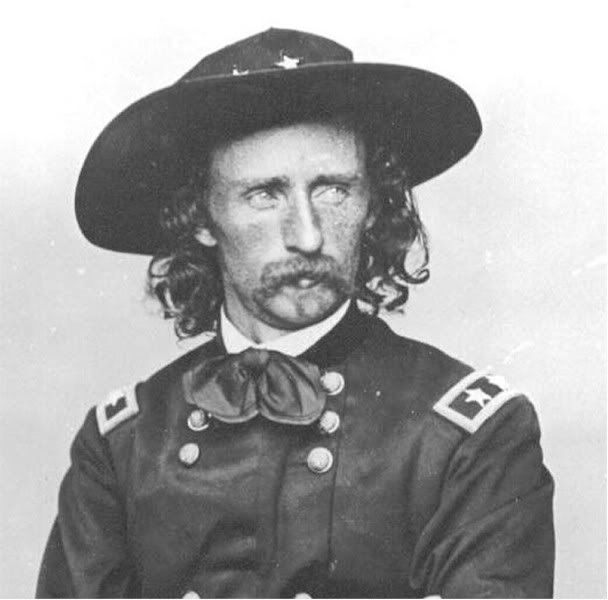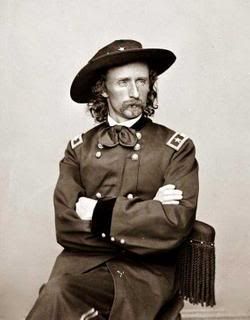
Was losing Major Elliot’s strategic location during the extermination of the Southern Cheyenne Arapaho at Washita by Lieutenant Colonel Custer acceptable by U.S. military standards? Captain Benteen thought not.
Source
"Surely some search will be made for our missing comrades” mocked Benteen's piece, before concluding, "No, they are forgotten."
Custer picked the wrong man to threaten horsewhipping.
Crossposted at Native American Netroots
Source
One of Custer's friends sent Custer a copy of this letter. Custer was enraged, and threatened to horsewhip the man who wrote it. Benteen admitted authorship, after which Custer dismissed him with a curt, "Colonel Benteen, sir, I'll see you later!"
Custer never carried through on the threatened horsewhipping, and Bush never carried through with his threat to punish whoever leaked Libby’s name, either.
Source
Mr. Bush said in 2003 that he would fire whoever leaked the information about Mrs. Plame's identity.
Consequently, what a feeling of "I wish I'd known then what I know now" both of them might of felt. No, that would've meant either one would've ever regretted anything they ever said, unless it meant losing power.
The historical debate revolves around two questions: did Custer retreat on purpose, believing Lieutenant Godfrey about more encampments downstream, thus retreating for his own survival? Or, did Custer really not know where Major Elliot was?
A look at the map of the Washita Massacre reveals an answer.
Lieutenant Godfrey had told Custer there was more gunfire downstream, and Major Elliot was killed perhaps two miles from where Moxtaveto ("Black Kettle") was. Custer and his men were on horseback. Was that too far to travel in snow on horseback, knowing the "enemies" were downstream and having heard a report of gunfire in that direction? How long would it have taken to ride that distance in those conditions? Twenty minutes? Less than forty?
A man commanding the military deserts his comrade troops and their need for safety in order to save himself and his public image for continuing a war. Imagine that.
Captain Benteen found Custer to be arrogant.
On January 29, 1867, Benteen met George Armstrong Custer, the Lieutenant Colonel of the regiment. Benteen disliked Custer almost immediately, finding him vain, arrogant and egotistical.
I can't think of anyone commanding the military now who is "arrogant, vain, and egotistical," who doesn’t give them the support they need and lets them die (yes I can).
That aside, there is another sense that is crucial in making sound judgments I believe: emotional intelligence.
I Think Captain Benteen displayed enough emotional intelligence –
Source
Salovey and Mayer defined emotional intelligence as the: "Ability to monitor one's own and other's feelings and emotions, to discriminate among them and to use this information to guide one's thinking and actions."
- to be correct about both Custer’s character and Custer’s abandoning Major Elliot at Washita. Metaphorically, it doesn’t take much emotional intelligence to see it repeating now.
John (Fire) Lame Deer And Richard Erdoes. “Lame Deer, Seeker of Visions.” p. 95-96.
And that’s what I want to talk about. Some of our young Indians have bumper stickers on their cars – “Custer Died For Your Sins!” – but I’m telling you, Custer is alive!
Indeed, and in the Whitehouse.

John (Fire) Lame Deer And Richard Erdoes. "Lame Deer, Seeker of Visions." p.96.
• There's a little Custer in all those sightseers, souvenir hunters, rock hounds, tourist scalpers, sharps and Deadwood hookers which cover these hills (Black Hills) like so many ants.
And there's a little "Custer/Bush" in all the Congressman, Senators, lobbyists, neocons, and Religious Right who support and want the war, deny climate disintegration, and cover Capital Hill "like so many ants."
A commenter who I agree with offered the following insights into this diary, which is a repost since ”Today marks the anniversary of an iconic moment of American history: Custer's Last Stand, the culmination of Lt. Col. George Armstrong Custer's disastrous attack on a coalition of Lakota Sioux, Cheyenne and Arapaho Indians camped on the Little Bighorn River.” I wish to thank that person for giving a few corrections.
Ways not comparable:
Up until Little Big Horn, Armstrong had earned quite a bit of respect as a competent field commander, in comparison to other officers of the era, so let's do compare.
As for social attitudes of the era, Armstrong was not out of the main stream. Americans of the era if conversing with us now would eagerly classify the
Native Americans as "insurgent terrorists", as primatives worthy only of extermination, or conversion, rather like so many Americans classify today's extremist middle easterners.
Armstrong had military live-fire experience and demonstrated battlefield leadership, versus W.
Armstrong was likely far more competent and intelligent as an officer, and usually was pretty realistic in what can be achieved, versus W.
No one questioned whether Armstrong was AWOL or away from duty posts.
Armstrong was articulate and conversant with tactics, strategies, and had real training.
Armstrong made a few big choices that were bad, versus nearly the avalanache of W's big choices that have gone bad. He may have arrogantly overestimated the value of his technological edge and the skilled execution his soldiers could perform.
Any general officer must be mindful of the social impact of their actions, yet not let it inhibit execution where specific 'national interests' are defined for him by the executive branch.
Might be interesting to compare W with Armstrong's idea of staying the course
Labels: winter rabbit
Unknown on 6/26/2008 12:28 AM:
Michael Elliott has a different take on Custer and the Native Americans (via Ralph). To me, it sounds like the sort of muddying-of-the-historical-waters that the folks down South do when they rant and rave about black Confederates. Whether or not conquered peoples fought alongside the U.S. Army, the fact remains that the U.S. Army was making racial war on those who shared their racial heritage.
Winter Rabbit on 6/26/2008 1:51 AM:
Well, the response to the flag I heard at Red Earth last year was, “Some people asked us why we have the flag. Our ancestors looked at it and said ‘The red stands for the blood of our ancestors spilled before the U.S. became a country, the white stands for peace, and the blue stands for Father Sky, the Great Spirit who watches over us all.’”
Without taking out the book, tribes such as the Crow were just using the U.S. military to defeat tribal enemies, which is the general concept behind the issue of the “Scouts.” Some like the one in the article like to look at that and say they weren’t very peaceful after all, completely sidestepping what I pointed out in “Sitting Bull Was Right” plus the fact tribes never fought a Religious War. The scouts weren’t trying to commit genocide, and that realization that the U.S. wanted to destroy them as a people didn’t even start to sink in until after the Sand Creek Massacre. One can’t homogenize the American Indian into the Holocaust being struck against them, but that’s what he does by saying “What few Americans know is that the command of about 600 men Custer led into battle in 1876 included about 35 American Indians, mostly Arikaras but also six Crow and a few Santee Sioux.” Whatever.
But, that doesn’t get to the heart of the matter, either. Take the Osage scouts who did the mutilations at the Washita Massacre. They, like all the other “Scouts” wore a U.S. Army uniform. However, just like Blackwater today with the recent “wanton killing” in Iraq as a private contractor, the U.S. finds a loophole to avoid accountability. The U.S. made the scouts part of the extermination policy, who were fighting tribal enemies over hunting and horse theft. Has Blackwater been charged for War Crimes yet, or were the Scouts guilty of genocide? Pretty serious question, let’s answer it. Keep in mind the Crow and the Sioux were known horse stealers and as a consequence in 1851 the Comanche, Kiowa, and Apache didn’t want to meet at Fort Laramie for a big “Peace Council.” This is what some want to homogenize the American Indian into that they don’t want to see at all.
THE EIGHT STAGES OF GENOCIDE
1. CLASSIFICATION: All cultures have categories to distinguish people into “us and them” by ethnicity, race, religion, or nationality: German and Jew, Hutu and Tutsi.
2. SYMBOLIZATION: We give names or other symbols to the classifications. We name people “Jews” or “Gypsies”, or distinguish them by colors or dress; and apply them to members of groups. Classification and symbolization are universally human and do not necessarily result in genocide unless they lead to the next stage, dehumanization. When combined with hatred, symbols may be forced upon unwilling members of pariah groups: the yellow star for Jews under Nazi rule, the blue scarf for people from the Eastern Zone in Khmer Rouge Cambodia.
3. DEHUMANIZATION: One group denies the humanity of the other group. Members of it are equated with animals, vermin, insects or diseases. Dehumanization overcomes the normal human revulsion against murder
For the sake of argument, let’s say the warring tribes classified each other, maybe they gave symbols to the classification with the scalps. But that’s about as far as it goes.
This is an example of why I think some homogenize the American Indian into the U.S. extermination policy, besides the psychological reasons.
The Peace Chiefs of the Cheyenne by Stan Hiog. P. 68
“A youthful Cheyenne Warrior named Lean Bear saw a glittering ring on the hand of an officer’s wife…Lean Bear took hold of the woman’s hand to get a closer look…”
You can imagine that didn’t go well, but it illustrates why the scouts were using their new found power to use against their old tribal enemies, while simultaneously the U.S. was acting out the genocide: cultural differerences.
I’ll ask once more, has the U.S. Army been charged for War Crimes yet?
Right, and they likely never will be.
Sorry so long a post and all, but that article pissed me off.






Very interesting. Probably not the guy Bush would enjoy being compared with. Though given his proclivities, perhaps he might.